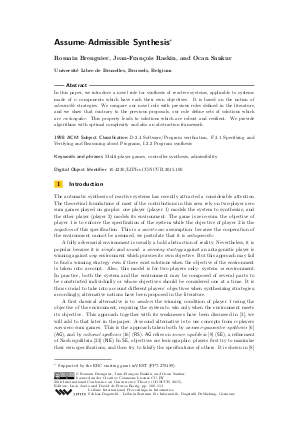Assume-Admissible Synthesis
Authors Romain Brenguier, Jean-François Raskin, Ocan Sankur
-
Part of:
Volume:
26th International Conference on Concurrency Theory (CONCUR 2015)
Part of: Series: Leibniz International Proceedings in Informatics (LIPIcs)
Part of: Conference: International Conference on Concurrency Theory (CONCUR) - License:
 Creative Commons Attribution 3.0 Unported license
Creative Commons Attribution 3.0 Unported license
- Publication Date: 2015-08-26
File

PDF
LIPIcs.CONCUR.2015.100.pdf
- Filesize: 0.53 MB
- 14 pages
Document Identifiers
Subject Classification
Keywords
- Multi-player games
- controller synthesis
- admissibility
Metrics
- Access Statistics
-
Total Accesses (updated on a weekly basis)
0PDF Downloads0Metadata Views
Abstract
In this paper, we introduce a novel rule for synthesis of reactive systems, applicable to systems made of n components which have each their own objectives. It is based on the notion of admissible strategies. We compare our novel rule with previous rules defined in the literature, and we show that contrary to the previous proposals, our rule define sets of solutions which are rectangular. This property leads to solutions which are robust and resilient. We provide algorithms with optimal complexity and also an abstraction framework.
Cite As Get BibTex
Romain Brenguier, Jean-François Raskin, and Ocan Sankur. Assume-Admissible Synthesis. In 26th International Conference on Concurrency Theory (CONCUR 2015). Leibniz International Proceedings in Informatics (LIPIcs), Volume 42, pp. 100-113, Schloss Dagstuhl – Leibniz-Zentrum für Informatik (2015)
https://doi.org/10.4230/LIPIcs.CONCUR.2015.100
BibTex
@InProceedings{brenguier_et_al:LIPIcs.CONCUR.2015.100,
author = {Brenguier, Romain and Raskin, Jean-Fran\c{c}ois and Sankur, Ocan},
title = {{Assume-Admissible Synthesis}},
booktitle = {26th International Conference on Concurrency Theory (CONCUR 2015)},
pages = {100--113},
series = {Leibniz International Proceedings in Informatics (LIPIcs)},
ISBN = {978-3-939897-91-0},
ISSN = {1868-8969},
year = {2015},
volume = {42},
editor = {Aceto, Luca and de Frutos Escrig, David},
publisher = {Schloss Dagstuhl -- Leibniz-Zentrum f{\"u}r Informatik},
address = {Dagstuhl, Germany},
URL = {https://drops.dagstuhl.de/entities/document/10.4230/LIPIcs.CONCUR.2015.100},
URN = {urn:nbn:de:0030-drops-53711},
doi = {10.4230/LIPIcs.CONCUR.2015.100},
annote = {Keywords: Multi-player games, controller synthesis, admissibility}
}
Author Details
References
-
Brandenburger Adam, Friedenberg Amanda, H Jerome, et al. Admissibility in games. Econometrica, 2008.

-
Dietmar Berwanger. Admissibility in infinite games. In Proc. of STACS'07, volume 4393 of LNCS, pages 188-199. Springer, February 2007.

-
Roderick Bloem, Rüdiger Ehlers, Swen Jacobs, and Robert Könighofer. How to handle assumptions in synthesis. In SYNT'14, volume 157 of EPTCS, pages 34-50, 2014.

-
Romain Brenguier, Jean-François Raskin, and Mathieu Sassolas. The complexity of admissibility in omega-regular games. In CSL-LICS'14, 2014. ACM, 2014.

-
Krishnendu Chatterjee, Laurent Doyen, Emmanuel Filiot, and Jean-François Raskin. Doomsday equilibria for omega-regular games. In VMCAI'14, volume 8318, pages 78-97. Springer, 2014.

-
Krishnendu Chatterjee and Thomas A Henzinger. Assume-guarantee synthesis. In TACAS'07, volume 4424 of LNCS. Springer, 2007.

-
Krishnendu Chatterjee, Thomas A. Henzinger, and Barbara Jobstmann. Environment assumptions for synthesis. In CONCUR 2008, volume 5201 of LNCS, pages 147-161. Springer, 2008.

-
Krishnendu Chatterjee, Thomas A Henzinger, and Marcin Jurdziński. Games with secure equilibria. Theoretical Computer Science, 365(1):67-82, 2006.

-
Krishnendu Chatterjee, Thomas A. Henzinger, and Nir Piterman. Strategy logic. Inf. Comput., 208(6):677-693, 2010.

-
Edmund M. Clarke and E. Allen Emerson. Design and synthesis of synchronization skeletons using branching-time temporal logic. In Logics of Programs, volume 131 of LNCS, pages 52-71. Springer, 1981.

-
Patrick Cousot and Radhia Cousot. Abstract interpretation: a unified lattice model for static analysis of programs by construction or approximation of fixpoints. In POPL'77. ACM, 1977.

-
Werner Damm and Bernd Finkbeiner. Automatic compositional synthesis of distributed systems. In FM 2014, volume 8442 of LNCS, pages 179-193. Springer, 2014.

-
Luca de Alfaro, Patrice Godefroid, and Radha Jagadeesan. Three-valued abstractions of games: Uncertainty, but with precision. In LICS'04. IEEE, 2004.

-
E Allen Emerson. Temporal and modal logic. Handbook of Theoretical Computer Science, Volume B: Formal Models and Sematics (B), 995:1072, 1990.

-
Marco Faella. Admissible strategies in infinite games over graphs. In MFCS 2009, volume 5734 of Lecture Notes in Computer Science, pages 307-318. Springer, 2009.

-
Dana Fisman, Orna Kupferman, and Yoad Lustig. Rational synthesis. In TACAS'10, volume 6015 of LNCS, pages 190-204. Springer, 2010.

-
Drew Fudenberg and Jean Tirole. Game Theory. MIT Press, Cambridge, MA, 1991. Translated into Chinesse by Renin University Press, Bejing: China.

-
Thomas A. Henzinger, Rupak Majumdar, Freddy Y. C. Mang, and Jean-François Raskin. Abstract interpretation of game properties. In SAS, pages 220-239, 2000.

-
Paul Hunter. Complexity and Infinite Games on Finite Graphs. PhD thesis, Computer Laboratory, University of Cambridge, 2007.

-
O. Kupferman, G. Perelli, and M.Y. Vardi. Synthesis with rational environments. In Proc. 12th European Conference on Multi-Agent Systems, LNCS. Springer, 2014.

-
Zohar Manna and Pierre Wolper. Synthesis of communicating processes from temporal logic specifications. In Logics of Programs, volume 131 of LNCS, pages 253-281. Springer, 1981.

-
Fabio Mogavero, Aniello Murano, and Moshe Y. Vardi. Reasoning about strategies. In FSTTCS 2010, volume 8 of LIPIcs. Schloss Dagstuhl - Leibniz-Zentrum fuer Informatik, 2010.

-
John Nash. Equilibrium points in n-person games. Proc. NAS, 1950.

-
Amir Pnueli. The temporal logic of programs. In Foundations of Computer Science, 1977., 18th Annual Symposium on, pages 46-57. IEEE, 1977.

